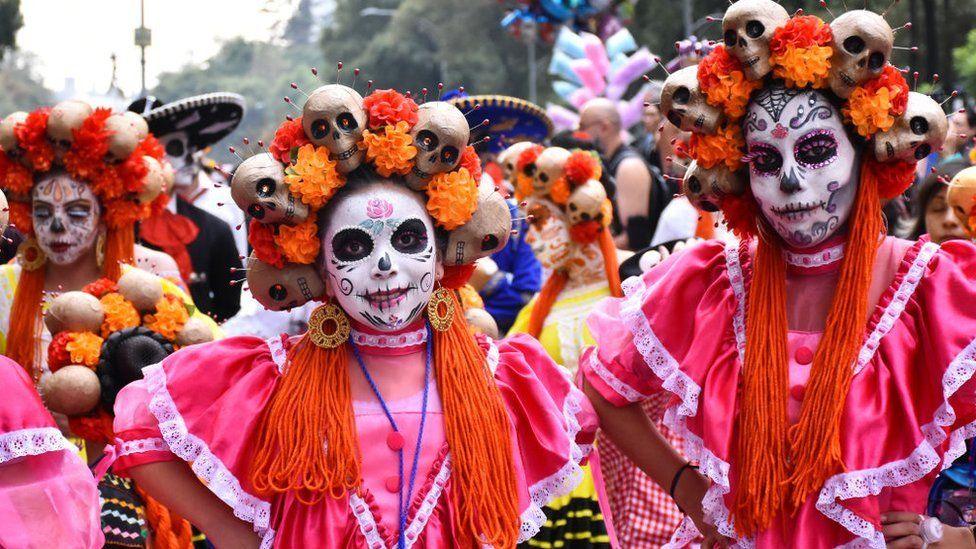Day of the Dead: What is it and how is it celebrated?

These two girls have dressed up to celebrate Dテュa de los Muertos in Mexico
- Published
On 1 November many people in Mexico will be celebrating Dテュa de los Muertos - Day of the Dead - but what's it all about?
Day of the Dead is an important festival held each year in South American countries, but especially in Mexico - you may have seen it in the movies Coco and The Book of Life.
The festival takes place on 1 and 2 November, (though some celebrations also take place on 31 October or 6 November) and is held to celebrate the cycle of life and death.
During the colourful festival big parades are held and people often paint their faces to look like skulls.
However they aren't meant to be scary, rather a way to celebrate and remember friends and family who have died and passed into the afterlife.
Read more about the festival below and test your knowledge with our quiz.
More like this
- Published27 October 2022
- Published3 October 2023
What is the history of Day of the Dead?
A drawing of what the Aztec Tenochtitlテ。n square and Templo Mayor in Mexico might have looked like in the 15th century
Day of the Dead's origins lie with the Aztecs, an indigenous group of people who lived in the area that would become Mexico City, around 2,000 years ago.
The Aztecs worshipped many gods and goddesses, including Mictト田acihuト》l - a goddess of death and ruler of the Aztec underworld - Chicunamictlan.
They believed that when a person died they made the journey to the depths of Chicunamictlan.
Aztec people left offerings on altars, or ofrendas, that would help their dead relatives on their journey to the afterlife.
When the Spanish Conquistadors invaded in the 1500s, they brought about the end of the Aztec empire, and brought with them the religion of Christianity.
So Day of the Dead comes from a combination of the ancient Aztec custom of celebrating dead ancestors, and the Christian celebrations All Hallows Eve, All Saints Day and All Soul's Day.
It's sometimes confused with Halloween but it's a very different occasion.
This lady is dressed as La Catrina
The figure of La Catrina is also a part of Day of the Dead's history.
La Catrina was a cartoon drawing by the illustrator Jose Guadalupe Posada around 1910, and her image was later turned into a huge mural in Mexico city by the famous artist Diego Rivera (husband of Frida Kahlo).
Many people dress up like La Catrina on Day of the Dead, and eat sugar skulls.
How do people celebrate Day of the Dead?
This family is having a picnic in the graveyard to celebrate their relatives
People celebrate Day of the Dead in lots of different ways.
Many people set up a candlelit altar in their homes, to help guide the spirits of their ancestors back home from the land of the dead.
Families will place offerings such their relative's favourite food, or items when they were alive - such as a favourite book or a musical instrument - on the altars too.
A woman dressed as La Catrina poses in a field of Cempazuchitl flowers - Mexican Marigolds
People often decorate these alters with bright orange and yellow marigold flowers, which are believed to attract the souls of the dead with their scent.
Families also head to graveyards on Day of the Dead for big picnics and parties, where they clean their relatives' graves, sing songs, and talk to their ancestors to make them feel loved, remembered and respected.
What are alebrijes?
One of the colourful alebrijes from a parade.
There are also big colourful parades with huge sculptures and floats of fantastical creatures known as alebrijes, which are designed and made from papier-mテ「chテゥ, cardboard or wood.
As well as honouring their ancestors during Day of the Dead, the festival is also a reminder that death is just a part of life, and that one day they too will be a skeleton - but hopefully not for a very long time!
